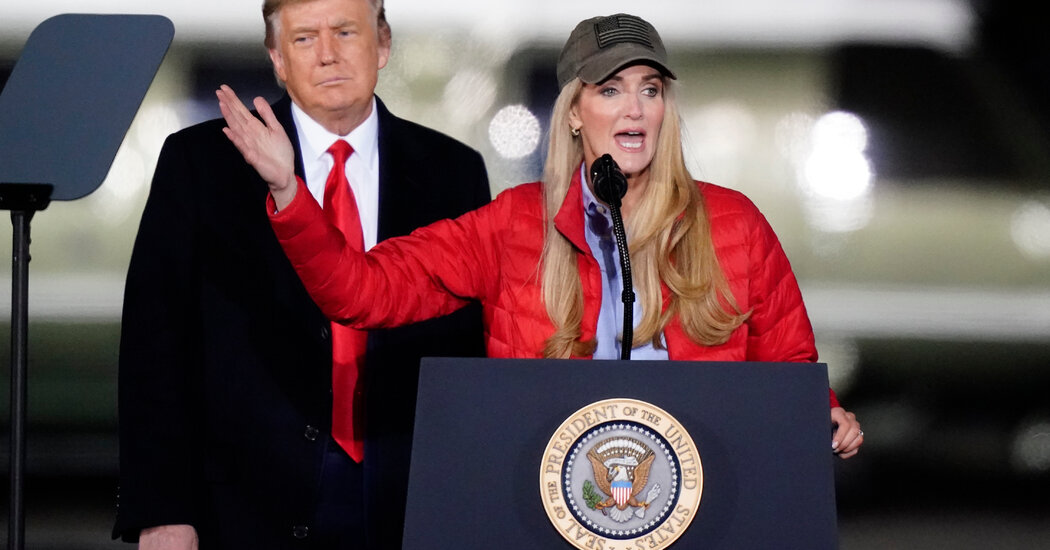Examining Kelly Loeffler’s Ties to the NYSE After the Capitol Rampage

Schwab cited “today’s hyperpartisan environment” as a factor. “We believe a clear and apolitical position is in the best interest of our clients, employees, stockholders and the communities in which we operate,” the company said in a statement. The company’s PAC had split its donations — $460,000 in the most recent election cycle — roughly equally along party lines. In the latest period, it gave to the House minority leader, Representative Kevin McCarthy of California, whose vote against certifying the election results made Schwab a target of ads calling out companies for funding lawmakers seeking to overturn the vote. “It is a sad byproduct of the current political climate that some now resort to using questionable tactics and misleading claims to attack companies like ours,” the company said, alluding to the pressure campaigns.
-
The company, which is a member of the Consumer Bank Association, said that closing its PAC would not diminish its voice with lawmakers, noting it was a “major employer in a dozen metropolitan centers.”
In other fallout from the Capitol insurrection:
-
Airbnb will cancel and block all reservations in the Washington area next week, amid fears of more violence at the inauguration of President-elect Joe Biden.
-
Google will ban political ads on its platforms until the inauguration. It follows similar moves by Facebook to limit the spread of election-related misinformation.
-
Jack Dorsey, the C.E.O. of Twitter, said he did not “celebrate or feel pride” in banning Mr. Trump from the platform, but urged followers to weigh in, asking: “Was this correct?” Thousands have responded.
“A driver may be human or may be software. I think there will be a long period of time in which it will be a hybrid.”
— Dara Khosrowshahi, Uber’s C.E.O., on the future of self-driving cars. On the latest episode of Kara Swisher’s Times Opinion podcast, Sway, he also discusses the effect of the pandemic on delivery services, the future of regulation in the gig economy and more.
Did Intel’s C.E.O. change head off an activist battle?
Intel moved yesterday to replace Bob Swan as C.E.O., two years after giving him the position on a permanent basis. Though the embattled chip giant insisted that the move was unrelated to pressure from the activist investor Dan Loeb, it’s surely hoping the change has placated the hedge fund manager.
Mr. Loeb’s Third Point fund pushed for change as Intel faces big challenges. The chipmaker’s stock has underperformed as manufacturing issues left the company trailing rivals like TSMC, Samsung, AMD and Nvidia. Intel has been losing engineering talent, raising questions about whether Mr. Swan — who has a finance background — was the right person to make tough technical decisions.
-
In a letter to Intel’s board last month, Mr. Loeb pressed the company to consider the separation of chip manufacturing from design, and unwind underperforming acquisitions.
Intel’s new leader will be Pat Gelsinger, the highly regarded C.E.O. of the software maker VMware, who was previously Intel’s chief technology officer. His engineering background — rather than pressure from Third Point — was behind the move, according to the company: “The board concluded that now is the right time to make this leadership change to draw on Pat’s technology and engineering expertise during this critical period of transformation at Intel,” Omar Ishrak, the company’s chairman, said.
-
In a stark assessment of what investors thought of the change, Intel shares jumped 7 percent yesterday, adding $15 billion to its market cap. Shares in VMware fell nearly 7 percent, worth about $4 billion in market cap for the smaller firm, which is bad for the company’s shareholders — but perhaps good for Mr. Gelsinger’s self-esteem.
All eyes are now on Mr. Loeb. He praised Intel’s move, tweeting: “Swan is a class act and did the right thing for all stake holders stepping aside.” But watch whether he files a slate of board nominees, signaling a potentially brutal proxy fight, before today’s deadline.
THE SPEED READ
Deals
-
The French government signaled that it may oppose Couche-Tard’s $20 billion takeover bid for the grocery chain Carrefour, citing food sovereignty and job security. (Reuters)
-
Two companies’ I.P.O.s priced above expectations: The pet goods retailer Petco sold shares at $18 each, raising $816 million, while the online marketplace Poshmark did so at $42, raising $277 million. (Reuters, Bloomberg)
-
Why SPACs are booming in New York but not in London. (Quartz)
Politics and policy
-
The Trump administration won’t bar Americans from investing in Alibaba, Baidu and Tencent as part of efforts to punish companies tied to China’s military. (WSJ)
-
Doug Leone, the billionaire head of the venture capital firm Sequoia, renounced his support for President Trump after last week’s Capitol rampage. (Recode)
Tech
-
Connecticut is investigating whether Amazon’s e-books business broke antitrust laws. (WSJ)
-
Carmakers worldwide are suffering from a parts shortage, and consumer electronics like PlayStations are to blame. (NYT)
Best of the rest
-
Climate activists criticized BlackRock for holding billions in investments in coal companies, despite its stated focus on climate change. (Business Insider)
-
David Barclay, the British billionaire who co-owned The Daily Telegraph newspaper and whose familial drama dominated headlines, has died. He was 86. (FT)
-
Let’s be honest, this is huge news even for a business newsletter: The N.B.A. superstar James Harden is leaving the Houston Rockets for the Brooklyn Nets in a four-team trade that could reshape the league. (NYT)
We’d like your feedback! Please email thoughts and suggestions to dealbook@nytimes.com.
*** This article has been archived for your research. The original version from The New York Times can be found here ***


